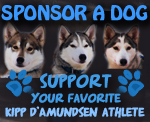A WORD ABOUT ANTIOXIDANTS IN DOG'S DIET
There is a trend in dog foods to utilize meat byproducts instead of grain and to increase the fat content to above 20%. The high meat and high fat content increases energy density and decreases stool volume over the grain based diets, which is a step in the right direction. Unfortunately much of the natural antioxidants in the diet are used up stabilizing fat during storage, as natural antioxidant vitamin E is used in the dry foods. This coupled with the fact that the antioxidant levels in the diet, as recommended by the NRC, were determined for young dogs at rest and not under stress.
Hard physical work, aging and stress greatly increase the requirements for all antioxidants. Although dog food manufacturers say that their diets are complete and need no additional supplements, why do we see improvements in performance when hard working dogs, dogs under stress, and geriatric dogs are fed antioxidant supplements?
Certain medical conditions are complicated by antioxidant deficiencies, and may respond favorably to antioxidant supplementation, especially those associated with stress.
Dogs and Antioxidants
In dogs, a deficiency of Vitamin E results in blindness, similar to senile macular degeneration in humans (Loew 1987). Vitamin C has been shown to be beneficial to racing sled dogs on high fat diets and has been reported to be of benefit in dogs with arthritis and/or hip dysplasia. Cleft palates, primarily a genetic disorder in dogs, can be aggravated by either a deficiency of Riboflavin or Vitamin A. The hair coat of Black Labrador dogs turning brown has been demonstrated to be a copper deficiency caused by zinc addition to the diet without a corresponding increase in copper supplementation.
FUNCTIONS OF THE ANTIOXIDANTS
Vitamin A - Skin, eye, bone, reproduction, growth
Vitamin C - Stress (spares Vit. E), bone, cartilage
Vitamin E -Stress, eye integrity, muscle integrity, reproduction, prevents oxidation of fat
Riboflavin - Stress, eye function, skin integrity, muscle strength of hind quarters
Folic Acid - Prevents birth defects associated with the nervous system
Zinc - Stress, immune response, wound healing
Manganese - Bone, tendon, muscle, birth weight
Copper - Immune response, hair color, reproduction
Selenium - Stress, muscle integrity, reproduction
© Copyright 2006, Kipp d´Amundsen Kennels and Services




